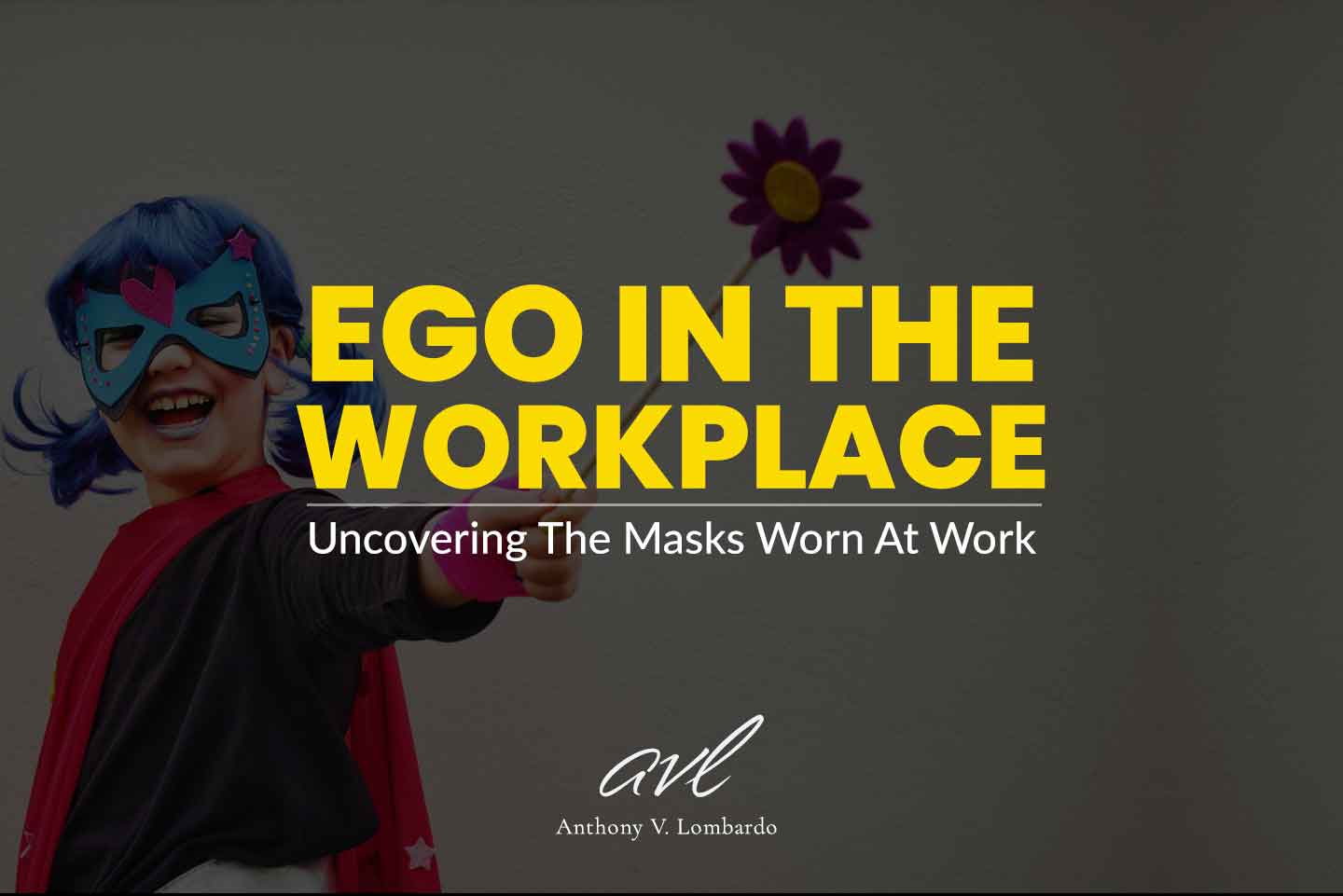
New Audio Experience: Awaken Your Soul and Remember Who You Are
Your Co-Workers Are Annoying And Your Boss Doesn’t Appreciate You. Here’s Why You’re To Blame.
Anthony V. Lombardo

To confront or not to confront our colleagues and coworkers who get under our skin.
That’s a question that every now and then pops ups in life.
Personally, I always found workplace interactions to be a bit whacky and unnatural.
For one, by its very nature, “the workplace” is an environment of constant evaluation, feedback, acknowledgment, praise, and criticism which means it’s a hotbed for triggering our ego in either direction — indulging it or destroying it.
Because we all to some degree want to feel like others see us as good at what we do, competent, reliable, and as a subject matter expert in our field or trade.
The other whacky part is that we interact and collaborate with these people almost every day, but do they really know us and vice versa?
When we show up for work, we’re all pretty much on our “best behavior”, keeping things light and cordial while doing our best to get along, and not stir the pot.
We engage in the typical on-the-surface small talk: what you did over the weekend, some TV show you binged on, what’s for lunch, and of course work-related stuff.
We slip into our “business mode” — playing that narrow role described by whatever our job title reads while rarely ever exposing our shadowy “emotional” side that we reserve for family and close friends.
And the people we work with only see this version of us and vice versa — that calm, cool, collected, conscientious “character” we’re so adept at playing.
But what happens when someone irritates us and that “shadowy” side of ourselves that we trained so well to conceal at work emerges?
A Typical Day At Work
Let’s face it, others can irk us and in our work or at our jobs it’s no different.
We’re still human after all and at some point or another, we’ve all experienced those interactions with someone we work with that quite frankly pissed us off.
Maybe your boss or supervisor took a firm tone with you that you were taken aback by.
A co-worker you’re collaborating with speaks to you in a way that gets on your nerves.
Maybe someone is openly critical of you or your work.
And while it’s not so much what was said to you, it’s their overall tone and demeanor that rubs you the wrong way.
It’s nothing insulting or disrespectful, but it’s stern — said with enough oomph with that “serious look” hanging from their face that convinces you that you are indeed being disrespected.
You’ve just been given a glimpse into that “serious side” which we rarely if ever see from the people we work with and you’re rendered speechless.
Instantly your inner child surfaces and interprets it that you are being scolded, “ordered around”, or “talked down to”.
Whatever has been sparked inside you, the bottom line is you feel invalidated.
It may feel that your skills and knowledge are under attack or your ability to do your job has been called into question.
In your mind, that image of expertise and supreme competence you’ve worked so hard to cultivate and uphold seems to have vanished.
As the day continues, you go from embarrassed to angry and feel you need to stand up for yourself.
When the workday is over you’re still replaying the situation over in your mind, obsessing on how they spoke to you.
A big part of you really wants to give them a piece of your mind tomorrow but another part of you feels it may not be worth it… and you know it’s not that simple because workplace interactions can be tricky.
The Classic Internal Debate
So the ambivalence ensues: do we say something or let it go?
On one hand, you should be able to stand up for yourself, right?
They should see that you’re no push-over.
You work hard. You’re good at what you do. And you’re just as smart and skilled as they are.
What’s the harm in talking to them to let them know you didn’t appreciate how they spoke to you?
You’re both adults and professionals. You deserve to get this off your chest.
As long as you do it calmly and respectfully.
But on the other hand…
Why give them the satisfaction?
You can’t let them see this side of you.
What if you come across angry?
After all, you have to work with this person every day. It could make things awkward going forward.
What if other people you work with find out what happened?
This is a common predicament we seem to find ourselves in throughout our lives beyond just at work: being torn between whether or not we confront someone who says something we don’t like.
So, what would you do? Do you confront them? What have you done in the past?

The Real Reason Your Upset
Here’s something to consider.
Despite how annoyed you are, the truth is, this situation is about YOU, not your coworker, colleague, boss, friend, etc.
Unless that person was directly insulting or abusive, they aren’t the source of our turmoil.
They didn’t hurt us.
It’s our ego that is bruised and our desire to confront them is only an attempt to repair it and make ourselves feel better.
We believe confronting them about what they did will bring us a sense of relief because deep down we want them to say something to validate us.
We’re hoping they tell us that they didn’t mean to come off the way they did and how it all was a misunderstanding
Maybe they’ll even apologize and throw some bouquets our way by telling us how much they value us and how good we are at our job.
All of this would feel really good to our ego because it is desperate to be validated.
“Getting things off our chest”
There’s a misconception about the notion of “getting things off our chest” — it’s not so much about “clearing the air” or coming to a resolution when you are having a difficult time with another person as it is about repairing your ego.
“Getting things off our chest” in most cases is self-serving — it’s an attempt to receive some acknowledgment from the person who hurt our feelings so we can feel better.
Because here’s the twist: you’re only hot and bothered because you’re putting your worthiness and value in this person’s hands.
At first, it was by interpreting that original interaction as not only an indictment on you professionally but as a negative reflection of who you are personally.
Your ego interpreted it as a threat to your unique value.
And now since your ego has been injured, it seeks to repair itself through the same channel that hurt it: by getting that validation and appreciation it desperately craves from the person who you felt trampled all over it in the first place.
If you think about it on a meta-level, it’s all a whacky game we’re conditioned to play: our ego gets destroyed by something someone says to us, and then we want them to build it back up.
And most of the time we’re unaware we’re doing this.
Instead, we direct our frustrations and anger towards the person who we believe triggered us without realizing it’s our ego that’s running us and causing all the madness we’ve been experiencing.
But this all part of being human: we all want our unique value as individuals to be appreciated, acknowledged, and “seen” by others.
And at our jobs and in our work this desire is heightened because not only are we playing that narrow role defined by some job title — but it all takes place in a setting where our value is largely determined by our performance and skills.
This makes it so easy to link our self-worth with the work we do and our career: that holier-than-thou job title, our perceived level of expertise, the praise or lack thereof for the work we do, the power and influence we have, how many direct reports we have, or the number of promotions and raises we receive.
So the answer is clear right, we shouldn’t confront them?
Beware: The Self-Preservation Trap
Here’s another interesting wrinkle to consider.
If you choose not to confront them, ask yourself why?
Is it because you don’t want to give them the satisfaction that you’re annoyed?
Do you not want to reveal you’re hurt to them?
If so, then you’re back to being run by your ego because you’re only refraining from confronting them to protect yourself and preserve “how you look”.
However, if you can truly let the incident go and forgo any need to confront the other person for no other reason than because you recognize this is about YOU and your ego’s incessant need to do what it does…
To seek validation, praise, and acknowledgment while protecting and upholding your image you present to the world, then you indeed have your answer.
After all, this will happen again. Someone will get under your skin — so you might as well be prepared.
Join the tribe of Conscious Creators!
Walking the spiritual path?
Sign up for the You Are A Conscious Creator Newsletter which curates hand-picked wisdom and insights for living a more conscious and meaningful life.


